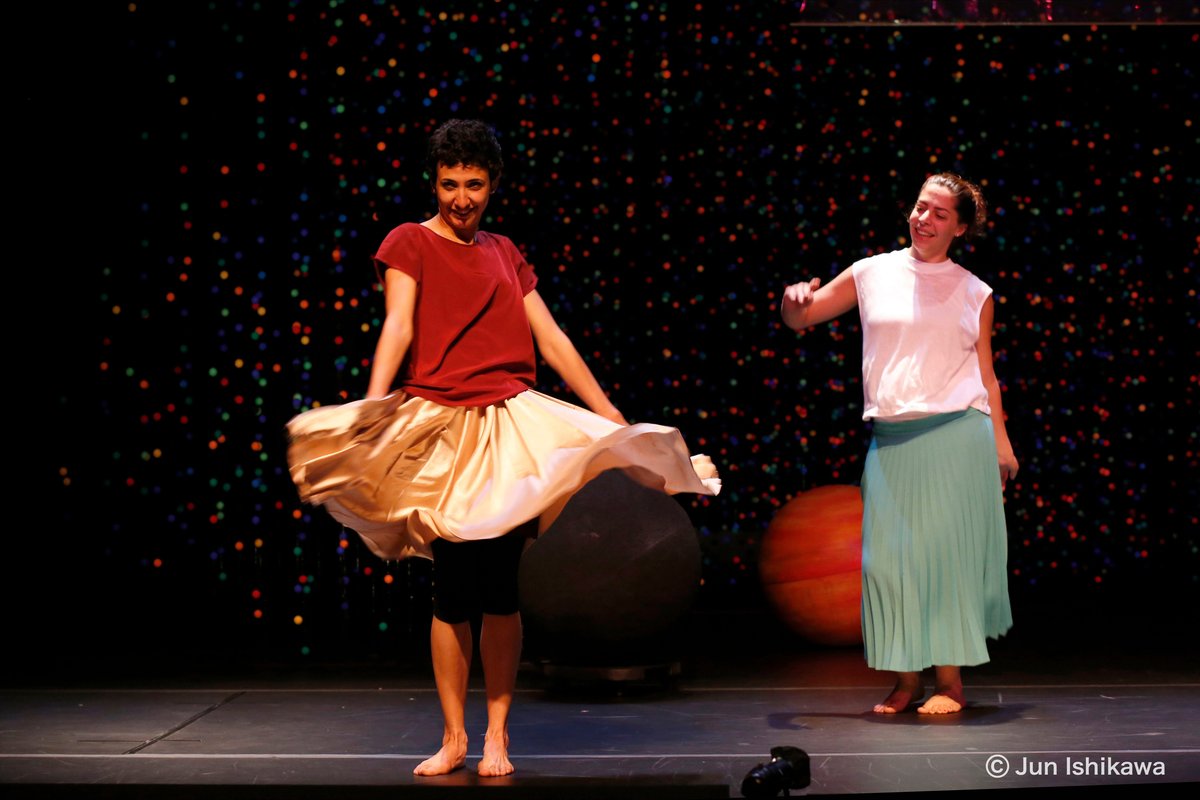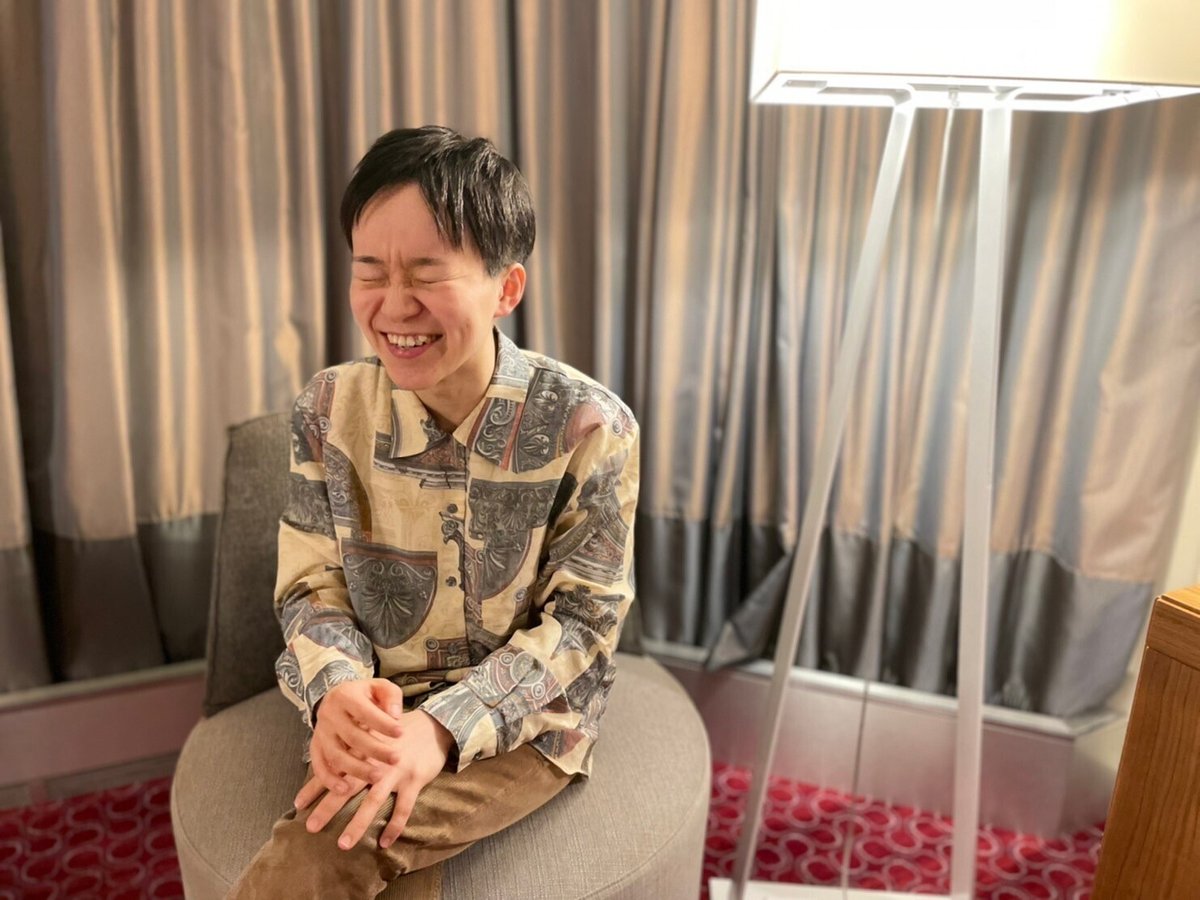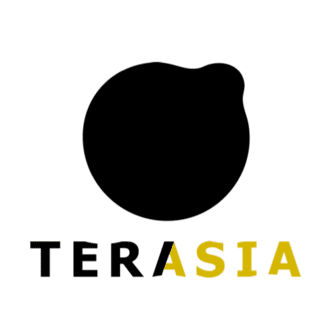
TERASIA Artist Interview Vol. 2 Maho Watanabe (dramaturg)
Maho Watanabe, who served as dramaturg for both Tera and TERA in Kyoto, spent her elementary school years in Qatar, discovered the world of theatre while studying abroad in Palestine as a university student, and is currently living in Switzerland.
During our interview on Zoom, what left a deep impression on us was her sense of attachment to the land.
“For four years and a half during elementary school, I lived in Doha for my father’s work,” she says. “I went back to Japan for junior and senior high school, and when it was time to go on to university, I didn’t want to be that person who just goes to a ‘good university’ for the sake of getting a job at a ‘good company,’ regardless of what they studied. Instead of following that kind of path, I wanted to do something distinct: a specialism that can’t be exchanged for anything else.”
“Ever since elementary school, I’d always felt an affinity and interest towards ‘the Middle East.’ And one thing I knew for certain was that Arabic is a difficult language. So I chose Arab Studies as my major.”
“I enrolled at Tokyo University of Foreign Studies, and I went to study abroad in Palestine. It was there that a lot of things changed in my life,” she recalls.
“At first, I think I had the vague idea that after graduating, I’d get a job at some company or organization and work in a field related to the Middle East. But once I went to Palestine, I became more and more attached to it. The people, the climate, the food—everything was great. For me, each day felt energetic and enriching.”
“But among the adults who came to Palestine for work, there were people who’d just go on complaining about trivial things in their personal lives—like ‘this is what’s inconvenient about living in Palestine,’ or ‘that’s what’s boring about Palestine’—instead of taking a more constructive approach to their work and trying to learn from the local people and culture. I felt kind of disappointed when I heard them talk like that.”
“Then, at the very end of my study in Palestine, there was Rashomon | Yabunonaka.”

It was this stage play that brought about Watanabe’s involvement in many theatrical projects, including TERASIA.
Rashomon | Yabunonaka is a theatrical work created by Palestine’s Al-Kasaba Theatre and a Japanese team, which became the main feature of Festival/Tokyo 2014, an international performing arts festival. It was directed by Yukari Sakata, who is now a TERASIA artist. As for Watanabe, she came on board as the interpreter for the entire process, from the time when Kaku Nagashima (the play’s dramaturg) and Sakata arrived in Palestine for the rehearsals to its final performance in Japan.
“Yukari-san and Kaku-san came to Palestine without having any special attachment to it, and they said things like, ‘Oh, I could totally live here,’ or ‘The food is amazing.’ Their response to the place was neutral, free from preconceptions. I really appreciated that, and I had a good impression of them off the bat. They stayed at a hotel, while I commuted from home to the theatre for rehearsals every day, just like the other actors. I was interpreting everything.”
Watanabe has a vivid memory of her experience from day one. “So many things were new to me. I may be the dramaturg for TERA now, but back then, I hadn’t even heard of it before. I had no idea what a stage director does, let alone a dramaturg.”
“On top of that, it was my first time working as an interpreter,” she continues. “There were times in the past when I was a quasi-interpreter for someone who came to visit from Japan, but I’d never tried to interpret the speech of a total stranger and put it into my own words.”
“In the beginning, I was just blown away by the whole experience. It’s hard to put a finger on anything specific, but I remember how surprised I was by the sheer amount of their conversations with each other. I think it’s part of their working style, but it wasn’t like there was a script prepared beforehand, ready to be translated—it didn’t go in that kind of order. Both Yukari-san and Kaku-san spent long hours speaking to each and every cast member to really get to know each other. Those conversations took up most of the rehearsal time in Palestine.”
“I was pretty overwhelmed. It was all I could do to keep up. So many words I’d never even thought of kept popping up everywhere. Everything was unpredictable—what the actors would say, and how Yukari-san and Kaku-san would respond on the spot. And when it came to talking about the play, the conversation would shift to topics that were neither about the speakers themselves or their listeners. It would involve bigger, abstract themes like “what it means to live or die.” I had to navigate through many words that I didn’t normally use, and it took quite a lot of effort for me to grasp their full meaning, to convert it in my head, and to convey it to the other side. It left me completely exhausted each day.”
“But at the same time, it was an absorbing experience,” says Watanabe. She gained much from this project.
“For one thing, I had the opportunity to meet Yukari-san and Kaku-san, two very interesting Japanese artists in the world of theatre. Also, I watched the Palestinian actors at work and was surprised to find such passionate people, who worked so hard and gave it their all every single day. Through listening to their conversations and interpreting for them, I learned that they had all started out with motivations that were a far cry from the dazzling world of actors that one might imagine. These actors in their 20s and 30s chose to pursue the performing arts and to become an actor, even though it’s definitely not an easy path in the Palestinian society. With such backgrounds, their performances were so solid and powerful. It made me want to see more and more performances like theirs.”
“And so, after an extremely challenging process, the play reached the audiences in Japan, and it may have changed something within each of them—which might, in some remote way, turn into a small seed of change for something about Palestine. Those three things led me to where I am now. Honestly, I’m so glad I was a part of Rashomon | Yabunonaka!”

After returning to Japan to finish up her university years, Watanabe got involved in theatrical productions across Japan. She took on a wide range of work both in the theatre world, including subtitle creation and being an interpreter for the creative process, and in other fields, such as interpreting at talks and workshops.
“I was working part-time because I was still an undergrad, but it was a lot of fun,” she says. “To be honest, I didn’t want to come back from studying abroad in the first place. I felt at home in Palestine, thanks to the wonderful people around me—there was always so much to learn that each day felt meaningful and exciting. When I did return to Japan, and I found the reality of job hunting waiting for me, it was rather depressing. I lived for those opportunities in creative work that came along now and then—it kept me going. Thanks to them, I started listening to or watching a broader range of music and films, as well as going to see plays, exhibitions, and things like that.”
Watanabe’s love for colloquial Arabic was also a factor that drew her to the world of theatre.
“In Arabic, the language for writing and the language for speech are quite different,” she explains. “The Arabic we learn in the classroom is the standard written language. But there are totally different kinds of Arabic spoken by the local people, depending on the region, and those are rarely taught in the classroom.”
“For example, speeches by politicians or news on TV are in standard Arabic, but what I liked more was how the people spoke, the people right in front of me—in my case, the dialects in Palestine. That’s another reason I was drawn to contemporary colloquial theatre, to the plays performed in that kind of language.”
“Also, rehearsals are the juiciest part of theatre. I think I just like watching bodies move and speak. That’s why I had so much fun working in the performing arts.”
“When I thought about what to do after graduating from university, I realized that I wanted to get involved in any and all theatre productions, workshops, and similar projects that might come to Japan from the Arab-speaking world—though I had no idea when that would happen, or even whether it would happen every year. In order to do that, I need to be able to clear out a substantial chunk in my schedule whenever projects like that come along. And that meant freelancing was probably the only choice for me. So that’s how I chose my path.”
These thoughts led Watanabe to quit job hunting and to continue her work as an interpreter and a translator. She won the 12th Odashima Yushi Award for Drama Translation (2019) for her translation of Lilac Duhaa (Death in the Era of IS) by the Palestinian playwright, Ghannam S. Ghannam. It was performed at Saitama Arts Theatre by the Saitama Next Theatre troupe.

“All the while, I was constantly collaborating with Yukari-san. There were various projects that never saw the light of day. Sometimes I was the coordinator; sometimes I wrote grant applications or translated her website. So, in fact, Tera wasn’t our first collaboration in four years.”
But in Tera, Watanabe took on the role of dramaturg. It was a different experience altogether from her previous work as an interpreter or translator. Moreover, the play was to be performed in Japanese, in Japan, taking as its theme the views of life and death and spirituality in Japan.
At first, Watanabe had misgivings. “I wondered if I’m fit for the role,” she recalls. “But I also knew that even if I’d be called a ‘dramaturg,’ it wasn’t like I was expected to be the next Kaku Nagashima-san. My response was ‘I don’t know if I can be of use, but if you’re inviting me to join in, then I’m more than happy to.’ It was full of unknowns, but I was determined to do whatever I could to contribute.”
When asked about the themes in Tera, she says, “I’d always been interested in topics like the beliefs of Japanese people. The Middle East is a predominantly monotheistic world, so polytheism is completely outside the picture, as it were.”
“For example, when the Hayachine Kagura of Iwate Prefecture was invited to an arts festival in the United Arab Emirates (UAE), I was there as an interpreter to explain the concept of kagura (sacred dances and music performed at shrines). But in the worldview of the one and only God, Allah, I struggled very much to find words for the yaoyorozu-no-kami (countless gods) of Shinto.”
“One thing I remember even more vividly, though, is when I went to the UAE on that occasion and was asked to write down my religion alongside my name and birthdate on the papers,” she continues. “From back in the days when I lived in Qatar, I categorized myself as a Buddhist—it probably started with my parents—so whenever I had to fill in forms like that, I’d put down ‘Buddhist’, though I don’t even know what sect of Buddhism my family belongs to, nor does my family go to a specific temple for our ancestors (bodaiji). When I entered the UAE that time, I just wrote down ‘Buddhist’ without much thought, as usual. But I noticed that the kagura performers had written ‘Shinto’ on their forms. Of course, it’s no surprise that they would be following Shintoism, but at that moment, I realized that my lack of awareness towards religion isn’t because I’m Japanese—that there are, in fact, people in Japan who belong to various faiths and practice their religion.”
She looks back at the process of making Tera from scratch.
“As for creating Tera, it was a huge struggle until we had a firm grasp of the structure of the script. We built the play based on Juro Miyoshi’s ‘Daffodils and Wooden Fish,’ but even when we were in the middle of rehearsals, we felt we were missing a poem somehow…. One day, when the first performance was fast approaching, we realized we definitely needed that poem after all! We paused the rehearsals for a day and ran to the library. At the Tokyo University of the Arts library—where I also entered with a visitor’s pass—I looked through the contemporary poetry shelves and came across a bright pink book by Taeko Tomioka. I called out, ‘Yukari-san, look!’ and she went, ‘Nice find!’ Digging up that book was my contribution to Tera that could be called the work of a dramaturg, though only just.”
“When I look back, I can see how Yukari-san, Miho-san, and Kyojun-san’s energy spurred on the project, creating an incredibly engaging theatre piece. As for the part I played in Tera, it’s not as straightforward as interpreting or translation, so I don’t feel at all as if ‘I’ve made something’ myself.’ But I feel that we all found a way to do what we envisioned. I’m sure it was quite a hard process for Miho-san and Kyojun-san, but they’ve materialized what they wanted to do—and the same can be said for Yukari-san and myself.”
“For example, those song performances between the 108 questions—that felt fantastic. I like it when you swing as hard as you can, as much as that level, so I was like, ‘YES!’”

Now that Tera has spread to other countries in Asia and transformed into TERASIA, Watanabe is in charge of liaising daily between international artists.
“When I saw the Thai production, TERA เถระ, in October 2020, I felt so gratified, so glad to have kept working on this. Yukari-san and I have worked on various projects together, and this one finally became a reality. ‘I’m so glad we kept going’ sums it up, really.”
“I used to be the one getting invited to participate in projects, but now I’m on the producers’ side. At the end of the day, it all comes back to that bubbly excitement I felt when I first started interpreting. I feel lucky to have a place for meeting new people, listening to their thoughts, and thinking alongside them.”
“TERASIA enables me to sense the tangible presence of unknown worlds stretching out far and wide. That’s what’s at the heart of TERASIA, isn’t it? We listen to voices from local artists—rather than scholars or specialists—sharing their thoughts and experiences as an ordinary citizen living there. It’s different from seeing performers visiting us from their home countries. In TERASIA, you see these actors in motion in their local environment, speaking their local language, and the audience is right there with them, too… and all of that is included in the theatrical experience. I hope this would be a fascinating experience even for people who don’t usually attend plays.”
Now, TERASIA: Theatre for Traveling in the Age of Isolation is in its third year, passing the midway point of what will be a four-year journey. What’s in store for Watanabe in the near future?
“In TERASIA, the Vietnamese team is set to produce their new piece. They’ve welcomed me in like a member of their creative team, so I’ll actually get involved in making the piece. I’m excited to see where that goes. Besides my work for TERASIA, I’ve been invited to speak in an online program for senior high school students about topics like Palestine, interpreting, and theatre in society, so I’m looking forward to talking with young people, too.”
“These days, I’ve been a little busy. I’m actually in Palestine right now. I suddenly made up my mind and flew over from Switzerland. I’d been stuck in Japan for a long time, but now that I’ve managed to get out, I’m starting to feel more positive and hopeful.”

(Interview and text by Mikiko Endo, English translation by Yui Kajita. The interview took place on February 28th, 2022.)
Maho Watanabe
Dramaturg, interpreter, and translator. She encountered theatre while studying in Palestine when she served as an interpreter and translator for "Rashomon | Yabunonaka," directed by Yukari Sakata. Since then, she has been involved in performing arts projects, such as international co-productions, tours, and workshops. In 2020, together with Thai director Kop and others, she initiated “TERASIA: Theatre for Traveling in the Age of Isolation” and has played a vital role in collaborating with artists across Asia.
Mikiko Endo
Writer, planning and PR coordinator. Graduated from Tokyo University of the Arts, Department of Musical Creativity and the Environment.
Yui Kajita
Translator, illustrator, and literary scholar, currently based in Germany. PhD in English Literature from the University of Cambridge. Shortlisted for the 5th JLPP International Translation Competition, her publications include "Walter de la Mare: Critical Appraisals" (co-edited, 2022).
https://yuikajita.com
いいなと思ったら応援しよう!

